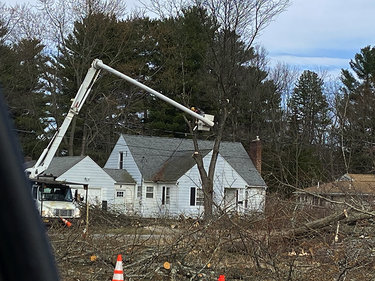Federal judge dismisses suit against Pyramid, Guilderland
GUILDERLAND — On Aug. 5, United States District Judge Mae A. D’Agostino granted a motion from the town of Guilderland and its planning and zoning boards as well as Pyramid Management Group and two of its subsidiaries to dismiss a suit filed by five Westmere residents and a Guilderland gas-station owner.
The suit was filed after Pyramid clear-cut more than two acres of trees on March 26 to make way for a Costco.
D’Agostino denied the “Corporate Defendants’ request for attorney’s fees” to be paid by the plaintiffs.
The suit, filed in the Northern District of New York, alleged the clear-cutting violated the federal Clean Water and Endangered Species acts as well as the state’s Environmental Quality Review Act and further violated the plaintiffs’ due process rights and privileges guaranteed by the 14th Amendment of the United States Constitution.
The plaintiffs wanted to stop further construction activities until, as their suit put it, there had been proper environmental review and also sought to replace the Guilderland Planning Board as lead agency in the state’s environmental review process “to restore a fair and impartial examination.”
On July 29, the Guilderland Planning Board determined Pyramid’s Final Environmental Impact Statement for its Rapp Road and Western Avenue projects to be satisfactory in its “scope, content, and substance,” and unanimously accepted the document as complete.
The plan includes three sites: a 19-acre plot at Rapp and Gipp roads for 222 apartments or townhouses, 16 acres at Western Avenue and Crossgates Mall Road for a Costco, and 11acres between the Costco site and Pyramid’s hotel on Western Avenue that could be used for retail, offices, or apartments.
The suit was filed by James Bacon, a lawyer based in New Paltz. Pyramid was represented by Whiteman, Osterman, an Albany law firm, and Guilderland’s town attorney, James P. Melita, represented the municipal defendants.
In her 23-page decision, the judge lays out the events of March 26 as presented by the two sides. The plaintiffs alleged that Kenneth Kovalchik, Guilderland’s town planner, “acted beyond the scope of his authority” when he permitted Pyramid to clear-cut the trees, authorizing the action without consulting the planning board. Pyramid, however, claimed it consulted with the town and Kovalchik “determined that no permit was required before the clear cutting could begin.” Following the clear-cutting, the town issued a cease-and-desist order.
D’Agostino writes that the plaintiffs admit they do not have viable claims under the federal Clean Water and Endangered Species acts “because they have failed to comply with procedural requisites.”
In discussing due process, D’Agostino notes a 1985 decision in which the Supreme Court created a two-pronged test for “takings” claims: the government agency must have issued a “final decision” on the matter, and the plaintiff must have sought just compensation through state procedure before resorting to federal court.
The final-decision requirement, D’Agostino writes, ensures that a federal court has the benefit of a fully developed record, has knowledge of how the regulation will be applied to the particular parcel, enforces the “long-standing principle that disputes should be decided on non-constitutional grounds whenever possible,” and “evinces the judiciary’s appreciation that land use disputes are uniquely matters of local concern more aptly suited for local resolution.”
She goes on, “Even just a cursory examination of the relief Plaintiffs seek supports the conclusion that this issue is not ripe for adjudication. Plaintiffs seek an order enjoining construction activities on the sites at issue, preventing the current lead agency’s SEQRA [State Environmental Quality Review Act] review, and requiring the re-establishment of another lead agency to finish the pending SEQRA review …
“Plaintiffs ask the Court to interfere with an ongoing SEQRA review process so that the Court can order the removal of the current lead agency, who Plaintiffs perceive as biased, despite the fact that they have yet to issue a final decision. This is exactly the type of outcome that the ripeness requirement seeks to avoid in these types of cases.”
On the merits of the plaintiffs’ claim, D’Agostino writes, “To prevail on a substantive due process claim involving a land use issue, the plaintiff must demonstrate that he had a valid property interest and that the ‘defendants infringed on that property right in an arbitrary or irrational manner.’”
While the plaintiffs allege they are now disturbed by traffic noises and headlights because of the tree-cutting, D’Agostino writes that these consequences are the result of Pyramid’s actions, not the town’s, and, to seek damages for such nuisances, they could have resorted to a private nuisance claim against Pyramid.
As to the allegations about the role of the town planner, D’Agostino writes that “it is clear that Plaintiffs have not plausibly alleged that the Town engaged in arbitrary or outrageous conduct.”
On the allegation that Kovalchik disregarded Guilderland’s town code and the state’s SEQRA provisions on alteration of property, D’Agostino cites a Second Circuit explanation: “substantive due process does not entitle federal courts to examine every alleged violation of state law, especially ones that, while perhaps vexatious, are more routine than egregious.”
D’Agostino concludes, “At worst, the Municipal Defendants allowed the Corporate Defendants to clear cut portions of their property. While this certainly could be seen as vexatious given that the property was undergoing a SEQRA review, it is not the sort of conduct that shocks the conscience or is ‘truly brutal and offensive to human dignity.’”



